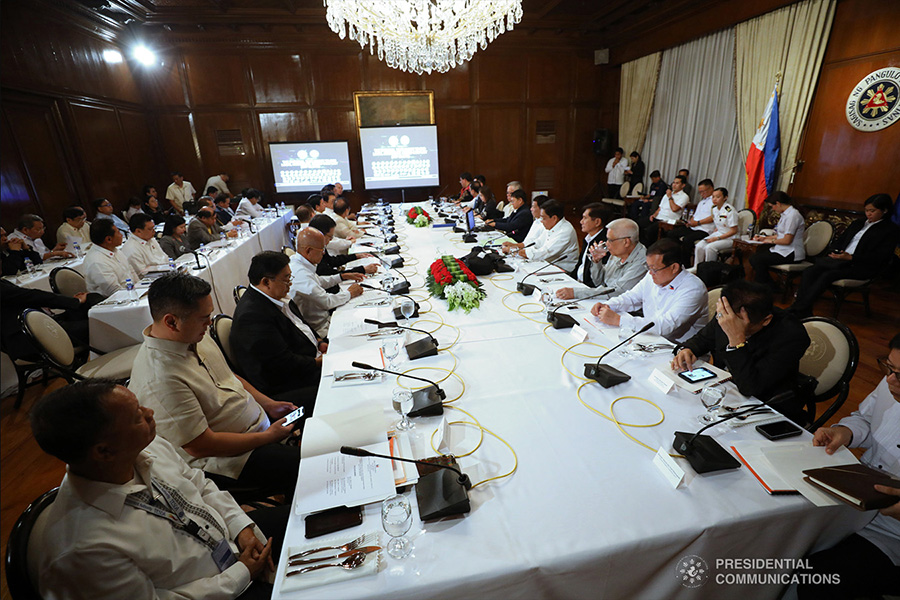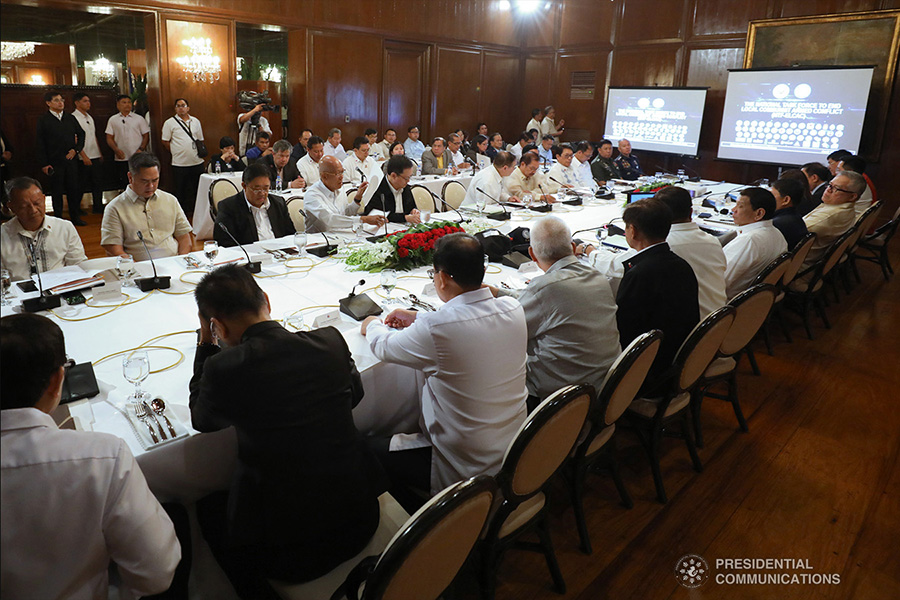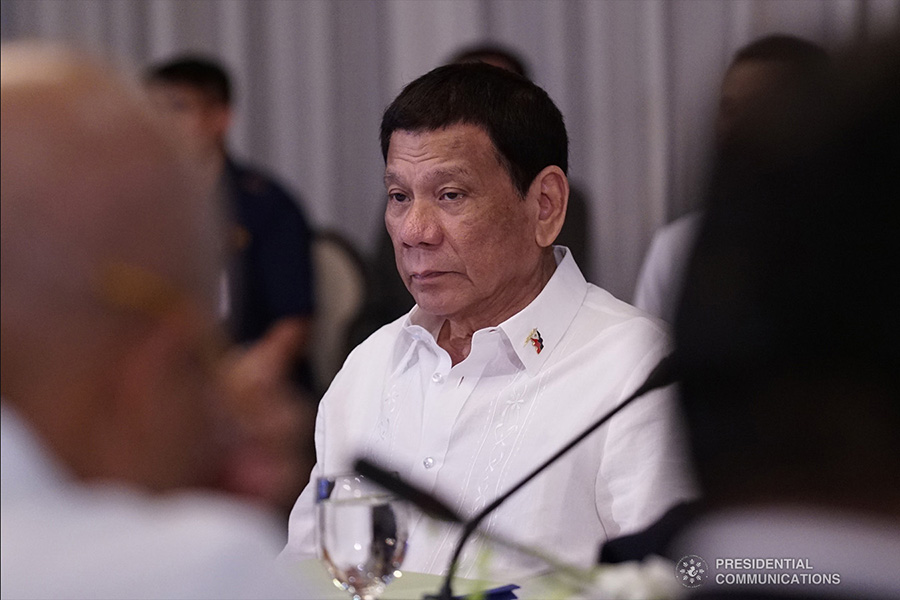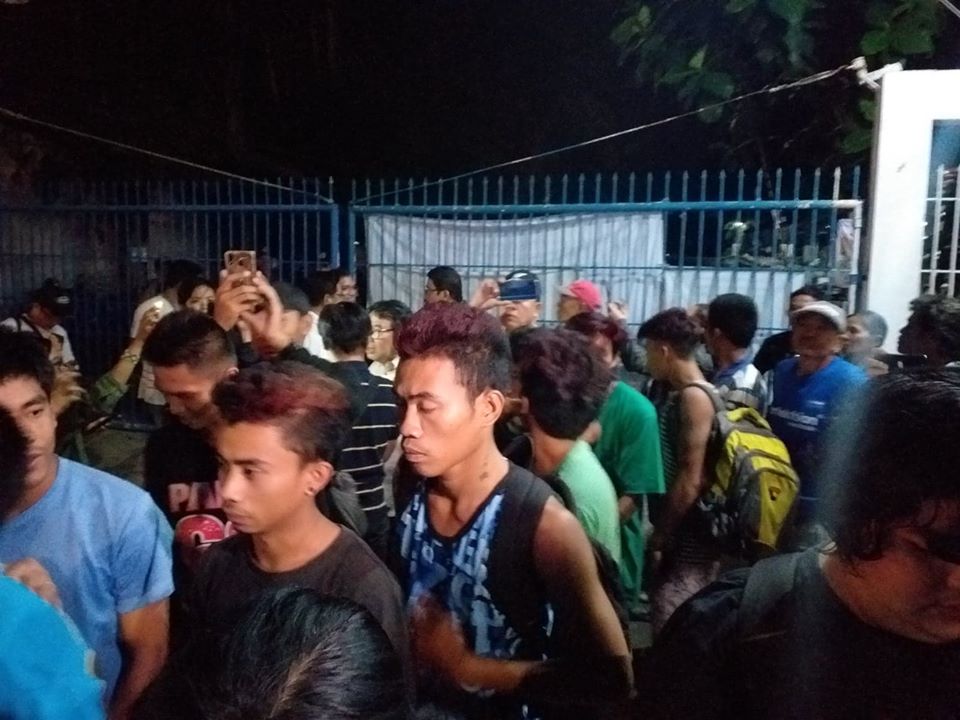Counterproductive counterinsurgency
By Sonny Africa
Development policymaking is hard enough as it is – the Philippines after so many decades of so many development plans is a case in point. Now the military wants to take that over as well? The government’s whole-of-nation approach where the military hijacks governance will just make the country’s maldevelopment worse.
Authoritarian creep
Pres. Rodrigo Duterte’s authoritarianism of course started with a big bloody bang – the thousands of urban poor the government killed in a show of intimidating force. The militarist takeover of government took a little bit longer but is well underway. The transformation has a thin veil of legality but the nation is as far away from real democracy as it has ever been.
The Duterte administration’s brand of militarism started with the National Security Policy (NSP) 2017-2022 it released in April 2017. Conspicuously, national security was defined broadly to “[encompass] virtually every aspect of national life and nation-building” where “economic development and security are inextricably linked”.
While conceptually valid, in retrospect these were less a sign of vision than gross and insidious ambition. It is difficult to credit a military establishment notorious for human rights violations, unwarranted violence, lying and deceit with having positive long-term aspirations. On the other hand, the appetite for dictatorship is easier to see.
The National Security Council (NSC) prepared the NSP. This collegial body includes many Cabinet members and legislators but is really dominated by the security sector – especially by the Armed Forces of the Philippines (AFP) and the Philippine National Police (PNP).
The broad definition of national security was immediately used to give the military and police an entry point into everywhere else in government. Executive Order (EO) No. 16 was released simultaneously with the NSP. This directed that “all government departments and agencies, including government owned and controlled corporations (GOCCs) and local government units (LGUs), shall adopt the NSP 2017-2022 in the formulation and implementation of all their plans and programs which have national security implications”. This is a far-reaching mandate because, according to the NSP, virtually everything has national security implications.
This was followed by the National Security Strategy (NSS) in 2018. The NSS was prepared by National Security Adviser Hermogenes Esperon and presented as a “blueprint [to] foster better coordination, synchronization and cohesion of government functions”. Its sweeping strategy included “the combined, balanced and effective use of the instruments of national power, namely: political and legal, diplomatic, informational, intelligence, economic, and military and law enforcement”.
Ominously, Pres. Duterte called for Filipinos to “stand behind our national security apparatus” and “strengthen the foundations of a secure, peaceful, modern and prosperous Philippines”. Towards this, the president gradually appointed 73 military and police officials to civilian positions in at least 46 agencies. There are now more military and police officials in government than at any time since the Marcos dictatorship nearly 50 years ago.
They were made heads in 38 of these as Cabinet secretaries, director generals, chairpersons, executive directors, administrators or presidents. As it is, former military and police officials account for 11 of 50 cabinet and cabinet-level officials or one-fifth of the Cabinet.

Authoritarianism now
All this fell into place when Pres. Duterte issued EO No. 70 in December 2018 creating the so-called National Task Force to End Local Communist Armed Conflict (NTF-ELCAC). The EO invoked the armed conflict to justify creating the task force and institutionalizing a “whole-of-nation approach” that will “integrate and harmonize the various efforts of the whole of government and of all sectors of society”.
Pres. Duterte is National Task Force Commander and chairperson with Esperon as vice chairperson. This places Esperon second only to the president at the top of an expansive organizational structure encroaching on virtually every government agency that matters, reaching from the regional to the barangay level nationwide. They preside over 18 Cabinet officials and two private sector representatives.
The high-level task force includes the secretaries of national defense, interior and local government, and justice as well as the AFP chief of staff, PNP director general, National Intelligence Coordinating Agency (NICA) director general, and Presidential Adviser on the Peace Process. Propaganda is handled by the Presidential Communications Operations Office (PCOO) Secretary.
To cover socioeconomic development concerns, the group also includes the secretaries of economic planning, finance, budget and management, public works and highways, agrarian reform, education, and social welfare and development, as well as the Presidential Adviser for Indigenous People’s Concerns, National Commission on Indigenous Peoples (NCIP) chairperson, and Technical Education and Skills Development Authority director general.
The 17 regional task forces (RTFs) under the NTF-ELCAC are each chaired by a Cabinet Officer for Regional Development and Security (CORDS) designated by the president. The military and police officials in the Cabinet are handy for this — eight (8) of the 17 Cabinet members appointed as CORDS are former military officers: Esperon (NSA), Carlito Galvez (Presidential Peace Adviser), Eduardo Año (DILG), Gregorio Honasan II (DICT), Roy Cimatu (DENR), Eduardo del Rosario (HUDCC), and Delfin Lorenzana (DND).
The RTFs supplant regional structures in place and merge the existing Regional Development Councils (RDCs) and Regional Peace and Order Councils (RPOC). RDCs are the highest policy-making and direction-setting bodies for overall socioeconomic development in the regions. The RDC is composed of all governors, mayors, and development-related line agency regional directors. Upon EO No. 70, RDCs are also adding active military and police officials as special non-voting members.
RPOCs take up major issues and problems affecting peace and order. RPOCs are also composed of all governors, mayors, peace and order-related line agency regional directors, plus AFP commanders. Similar task forces are organized at the provincial, city/municipal, and barangay level. In effect, all these far-reaching multi-stakeholder bodies are put in a direct chain of command under the NTF-ELCAC and the national security adviser. This cumulatively amounts to hundreds of task forces nationwide and potentially even thousands if barangay efforts are counted.
The NTF-ELCAC’s seemingly disproportionate budget of just Php522 million belies its influence. All the memorandum circulars implementing EO No. 70 are clear that “the budgetary requirements for the implementation of EO No. 70 may be authorized chargeable against the respective LGUs and agencies in accordance with EO 70”. Regular agency budgets are put at the service of the NTF-ELCAC.
The NTF-ELCAC is fully up and running. The first RTF-ELCAC was organized in CALABARZON in February 2019 and the first provincial PTF-ELCAC in Cavite in March soon after. The national task force approved its National Plan in its first meeting in April 2019, held in Malacañang.
Other regions and provinces followed suit to organize their respective task forces. One-day island group summits of regional task forces were held in Luzon, Visayas and Mindanao in October to all culminate in a national summit with Pres. Duterte.
This year has already seen a frenzied surge of EO No. 70 implementation-related activity at every level of government across the country. This has gone far beyond armed conflict areas and the government’s militarism has intruded into schools, urban poor communities, offices, media, embassies, international agencies, and elsewhere. A National Capital Region (NCR) task force was even created in September 2019 even if there are no signs of armed conflict or insurgents in Metro Manila. The NCRTF-ELCAC is a hammer and activists, critics and political opposition are the nails it will be used on.

Hijacking development
EO No. 70 implementation includes weaponizing the law and criminalizing dissent. But it also in effect enables the military to hijack socioeconomic development policy for its militarist ends. Having construed national security and addressing the roots of armed conflict expansively, the national task force is broadly “authorized to evaluate, modify or integrate policies and programs” of government according to its plans.
The recent midterm update of the Philippine Development Plan (PDP) 2017-2022 is a case in point. This is regularly done for PDPs but there was something new this time around. Supplementary guidelines were issued to RDCs to “integrate” the NTF-ELCAC’s Cluster Implementation Plans in the updated regional development plans (RDPs) and regional development investment programs (RDIPs).
Accustomed processes were overridden and the NTF-ELCAC gave the RDCs plans to “mainstream” in the update. Regional planning committees were assigned to clusters as defined by the NTF-ELCAC, all of which had military officials from the defense department and AFP as members.
The national task force members include 18 government agencies. The various program clusters of the NTF-ELCAC implementation plan include most of these and 38 others, for 51 agencies in total. At least some of these agencies have created NTF-ELCAC “steering committees” to implement EO No. 70 and operationalize the national task force within their respective departments.
The problem with the national task force and the extensive machinery it creates is that it is, underneath a lot of development-speak and bureaucratese, still just another military scheme driven by a narrow-minded enemy-focused military mindset. It is essentially the Duterte administration identifying ‘enemies’ and using the full force of government against them.
EO No. 70 is not the military suddenly genuinely getting insights about the roots of underdevelopment and, much less, suddenly having the skills set to address this. The military is using the task forces to command resources for community programs, welfare services, and the like for its narrow counterinsurgency and anti-activism purposes. This muddles decision-making and prioritization according to actual development needs.
EO No. 70 is also being used to justify State security forces cracking down on development NGOs, people’s organizations, and all civil society groups whose advocacies the administration deems overly critical and putting it in a bad light. More to the point — the government is using all its political, legal, diplomatic, informational, intelligence, economic, military and police resources against any perceived domestic political opposition. In short, using all “the instruments of national power”.
The Duterte government is systematically going after organizations of workers, farmers, urban poor, youth, teachers, indigenous peoples, environment advocates, alternative media, cultural workers, disaster responders, and even researchers. Freedom of expression, freedom of assembly and even freedom of thought are under siege with the government deciding and enforcing what is and is not acceptable.
This gravely sets back prospects for real and democratic development. Curbing civil society suppresses a crucial check on government, stifles fresh development ideas upholding the rights of the majority, and constricts people’s participation in governance.

What is it all for?
At one level it is the Duterte administration coming down hard on the strongest voices against its authoritarianism, corruption, and policies enriching elites at the expense of the people. It is the Duterte clique putting down organized opposition to its self-serving agenda to stay in power and enrich itself.
But it is also much more than that. The Duterte government has come but, as with others before, it will also go. Unfortunately, what is happening is also the State pushing obsolete neoliberalism forward by eliminating obstacles to the market and to capital dominating every aspect of Philippine society. The groups being attacked have their own stresses and versions but nonetheless share a vision for a more just, humane and democratic Philippines.
This is consequential for the country’s political and economic prospects. We are in the middle of the Left and social movements violently being put down, under a thin veneer of rule of law, to increase the power of capitalists, landlords, and political elites. Activists are targeted because their clear politics, concrete organizations, and advocacies threaten the ruling class’s grip on power.
The ruling class embraces the Duterte government because it increases their wealth and profits: tax cuts on the rich and big corporations; infrastructure to keep the comprador economy humming and to preserve real estate wealth; privatization of transport, water, health and education; wage repression; land monopolies; and market- and capital-friendly policies all around.
The Philippines is in dire need of reforms and the sheer scale of the problem demands system-wide thinking and massive mass movement solutions. Yet the heavy-handed authoritarianism and military meddling in governance will just stoke even more unrest. This includes polarizing the nation and actually fueling the radicalism, and revolutionary armed struggles that the Duterte administration is so fearful of. #
(Kodao publishes IBON.org’s reports and analyses as part of a content-sharing agreement.)


